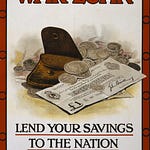Key: Rob’s comments are in italics. Derek’s comments in normal font.
On last week's call, we did an introduction to micro finances for small businesses and small business owners. We kind of left off the chat by saying, well, as pensions are the main vehicles for building your wealth over your lifetime, it's probably worth knowing how your pension is being invested and maybe having a bit more control over that. I wondered if we could pick up on that thread.

Right, okay, so once again, usual disclaimers. I'm not giving financial advice here, but what I am doing is giving you a bit of educational background into the mechanism, so that when you're discussing things with a so-called financial advisor, you can evaluate what they're saying and see what scope there is for making your own decisions. The arrangements for arriving at a pension are broadly the same as for any other kind of long-term wealth building. Essentially, you're putting money into something that yields a return, and you accumulate those returns into the fund so that it grows exponentially. Over time, it should end up with a capital sum. Then you move from the accumulation phase into the distribution phase, where you use the income to support the lifestyle you want without actively earning it any longer. Many people take this at face value and assume there's some kind of magic involved, but let's look at what's actually going on and how that wealth is generated.
If you go back to what we were talking about in the last call, whether you're running a small business or your household, there are processes whereby wealth is created. For example, a carpenter takes raw materials like planks of wood, works on them, and turns them into chairs, tables, and cupboards. This adds value through his activity and expertise, providing something of higher value that can be sold to cover business outgoings and provide an income.
Multiple Roles in a Small Business
Actually, I'd like to digress for a moment. Many small entrepreneurs don't reflect on the different streams of income they're getting from their business. As far as they're concerned, it's just like a wage. If you're running a one-person business, you've got several roles: you're a worker, a manager, a director, and an owner of the business. In larger enterprises, these roles are distinct individuals.
As a worker, for instance, in the example of the carpenter, you're doing the work, and there should be a going rate for that work. The best way of costing that is an arms-length basis of what you might expect if you were an employee of someone else doing that work, or what you might expect to pay someone you hire to expand your business.
The second role is a manager. The manager decides what needs to be done, sets priorities, and manages time on various tasks involved in running the business, including administration, billing customers, paying suppliers, dealing with taxes, and deciding on investments. The role of a manager typically commands higher pay than a worker.
Directors provide long-term strategy and direction for the business and supervise managers to ensure they're acting in the owners' interests. Finally, as a one-person business, you're the owner, akin to a shareholder. In larger enterprises, capital is pooled from many individuals to set up the business, such as a steelworks, and investors receive a regular income from the profits.
In a small operation like a carpenter's business, the owner would expect some remuneration once it's running at a profit, over and above what they get as a worker, manager, or director. This additional profit can be reinvested to expand the business or taken as a dividend.
Is that clear? Is there anything you want to clarify about what I've said so far?
No, I think we're all good. That makes sense. Relating that to my business, I obviously play all of those roles at the moment.
Capital and Investment
Right. The same applies to a larger operation. Assuming you've got a business that is a going concern, it owns the capital in terms of tangible assets necessary to run it, such as woodworking machinery, tools, and stock. If you're making a profit, you can either reinvest to expand the business or take it as a bonus for personal use.
If you need more capital, it can be sourced from existing owners or through loans. Loans come with fixed interest charges and repayment schedules. When building a pension pot or any long-term asset, you're investing in other businesses, typically through shares or bonds. Bonds provide predictable income and are considered safer investments, assuming the government or company doesn't default.
A bond is simply a note indicating that you have made a loan to that company and the company agrees to repay the loan at a specified future date, with interest.
Self-Invested Pension Plans
If you invest through a pension fund provider, they will extract fees, reducing the amount that accumulates. However, it is possible to do things through a self-invested pension plan, where you take control of investment decisions. This requires understanding company prospects, reading balance sheets, and evaluating investments. Consulting a professional is advisable, but ensure they're acting in your interests.
Is there a point at which it's more worthwhile to manage your own investments, such as having a larger income?
Obviously, this becomes relevant when you have a significant, stable income that covers your needs and generates a surplus. There's an entry requirement of knowledge, but it's doable with the right understanding.
What I'm providing is a big picture of the process behind the scenes, showing what's feasible in terms of returns, overheads, taxation, and reinvestment over time. Some people invest their pensions in commercial property projects, which requires knowledge about what to invest in.
For example, medium-sized businesses might need premises and set up a self-invested pension plan to invest in office space, then pay rent to the pension plan. This way, business expenses contribute to their own pension fund.
How much work and attention might it take to manage these investments? Is it something to check in on every few months?
It's definitely worth knowing the value of your fund at any time. Most plans send annual statements, which people often ignore. Management fees can eat into your funds significantly, with initial payments often going to advisors as commissions.
The Traditional Pension Model
All of this assumes a model where you work until retirement, then live off your pension. Some people may retire with too much or too late, missing out on desired experiences.
At any time, assess what you need for your desired lifestyle. Pension plans have regulations on when you can access funds, often allowing up to 25% as a lump sum, with the rest generating income. Annuities, purchased with pension funds, provide income but often offer disappointing returns due to low interest rates.
Annuities favor insurance companies as they keep the capital upon your death. Alternatively, you could invest in government bonds for steady income, leaving the capital for your heirs. Annuities might offer higher rates, but they assume a predictable lifespan based on large statistical samples.
My only other thought is that pensions seem simpler for salaried employees. Small business owners need to take more control, especially during income peaks, to decide what to do with the excess.
Right, there's more ownership required for small business owners to manage their finances effectively and plan for the future.
Thanks for reading this episode of Sovereign Finance. For more episodes, transcripts, in-depth articles, and the community, please take a minute now to subscribe free using the button above. You’ll receive a free email notification whenever we publish a new article or conversation.















Share this post